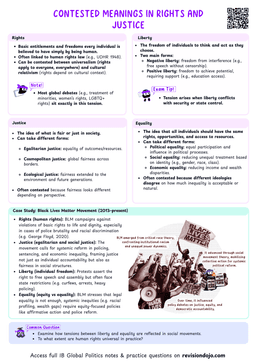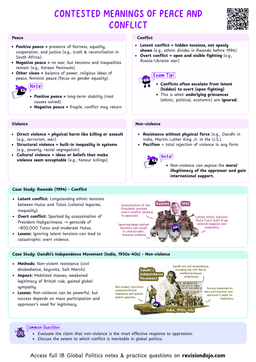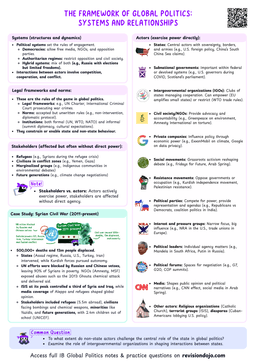Understanding Theory in Global Politics
- Theory in global politics provides frameworks for understanding, explaining, and predicting international relations and political behavior.
- Theories help simplify complex realities by highlighting key factors and relationships.
- Theories are not absolute truths; they are tools for analysis.
- Different theories may offer contrasting explanations for the same event.
The Role of Theory in Global Politics
- Simplification: Theories distill complex realities into manageable concepts.
- Explanation: They offer insights into why states and actors behave in certain ways.
- Prediction: Theories can help anticipate future trends and outcomes.
- Normative Guidance: Some theories provide ethical or normative frameworks for evaluating political actions.
- When analyzing a political event, consider how different theories might interpret the same situation.
- This can reveal underlying assumptions and biases.
Key Theories in Global Politics
Realism
Realism
A major theory in global politics focused on power and the idea that international relations are shaped by conflict and self-interest.
Key assumptions:
- Humans are naturally selfish and competitive.
- The international system is anarchic, there is no higher authority than the state.
Branches:
- Classical Realism (focus on human nature)
- Structural Realism (focus on international system)
Classical Realism
- Key thinkers: Niccolò Machiavelli, Thomas Hobbes
- Core belief: Human nature is egoistic and power-seeking; states reflect this nature.
- Hobbes’ view: Without authority, life is a "state of nature", "solitary, poor, nasty, brutish, and short."
- Implication: States act in their own self-interest, leading to competition and conflict.
Structural Realism (Neorealism)
- Key thinkers: John Mearsheimer, Stephen Walt
- Core belief: Power-seeking behaviour is caused by the structure of the international system, not human nature.
- Five key assumptions:
- States exist in an anarchic global system.
- All states have some offensive military capability.
- States can never be certain of other states' intentions.
- States seek survival as their primary goal.
- States are rational actors making decisions in their own self-interest.
Offensive vs Defensive Structural Realism
- Offensive realism (Mearsheimer):
- States should maximise power to ensure security.
- Global and regional hegemony are seen as strategic goals.
- Defensive realism (Kenneth Waltz):
- Pursuing too much power creates instability.
- States should balance power to maintain security.
- Defensive states are more likely to win wars due to home advantage and nationalist resistance.
- Costs of conquest often outweigh the benefits.
- Nuclear Weapons and Strategic Stability
- Retaliatory capacity: The ability to strike back after a nuclear attack.
- Mutually Assured Destruction (MAD): If both sides have second-strike capability, they are deterred from attacking first.
- Both offensive and defensive realists agree that nuclear weapons are only useful if both sides have them, and using them first is strategically irrational.
- Russia’s invasion of Ukraine (2022):
- From a realist perspective, Russia's actions can be understood as a pursuit of power, influence, and security in a strategically important region.
- Realists argue that Russia acted to protect its sphere of influence and counter NATO expansion, viewing the international system as anarchic and driven by self-interest.
- The invasion reflects the belief that states must rely on themselves for survival and that military power is essential in maintaining their position.
Liberalism
Liberalism
Liberalism is a major theory of global politics, seen as a response to realism. It emphasizes cooperation, interdependence, and the role of non-state actors. Unlike realism, it sees the international system as capable of change and progress.
- Core Assumptions:
- States are not the only actors; international institutions, NGOs, and multinational corporations also play significant roles.
- Cooperation is possible through interdependence and institutions.
- Democracy and economic interdependence reduce the likelihood of conflict.
- Key Concepts:
- Collective Security: States work together to prevent aggression.
- Democratic Peace Theory: Democracies are less likely to go to war with each other.
- Criticisms:
- Overestimates the effectiveness of institutions.
- Underestimates the persistence of power politics.
- The European Union is often cited as an example of liberalism in action, promoting peace and cooperation through economic and political integration.
Constructivism
Constructivism
A critical theory that challenges realism and liberalism. Argues that global politics is socially constructed through norms, beliefs, identities, and discourse. Rejects the idea of a single objective reality, what matters is how we interpret and give meaning to things.
- Core Assumptions:
- The international system is socially constructed.
- Ideas, norms, and identities shape state behavior.
- Anarchy is what states make of it; it does not inherently lead to conflict.
- Key Concepts:
- Norms: Shared expectations about appropriate behavior.
- Identity: How states perceive themselves and others.
- Criticisms:
- Lacks predictive power.
- Can be difficult to operationalize in empirical research.
- Finland and Sweden joining NATO (2022–2023)
- For decades, Finland and Sweden remained militarily neutral, shaped by their historical identities and norms of non-alignment.
- However, Russia’s invasion of Ukraine in 2022 dramatically shifted their national identities and threat perceptions.
- Public discourse and political narratives quickly reframed NATO membership, once seen as provocative, as essential for national security.
- This shift highlights constructivist ideas:
- Threats are not objectively fixed; they are socially interpreted.
- State identities can evolve rapidly in response to changing international norms and events.
Marxism
Neo-Marxism
Based on Karl Marx's theory, but applied to global systems. Focuses on class conflict, not just within states but between wealthy and poor countries. Emphasizes how capitalism and global economic structures create inequality and dependency.
- Core Assumptions:
- Global politics is driven by economic interests and class struggle.
- The international system is characterized by capitalist exploitation.
- Key Concepts:
- Economic Core vs Periphery
- The world is divided into wealthy "core" states and poor "periphery" states.
- Core countries benefit from global capitalism at the expense of the periphery.
- Dependency Theory
- Rich countries maintain dominance over poor ones through international institutions, aid, and unfair trade.
- Poor countries stay dependent, ensuring global inequality remains.
- Elites
- Elites in poorer states often align with global elites, not with their own citizens.
- Encourages corruption and mismanagement when elite interests are protected.
- Role of MNCs/TNCs
- Multinational corporations are not neutral players.
- They shape policy to exploit labour and maximise profits, often at the expense of local populations.
- Criticises the liberal idea that MNCs are benign actors of cooperation.
- Economic Core vs Periphery
- Criticisms:
- Overemphasizes economic factors.
- Neglects the role of culture and ideology.
Cobalt Mining in the Democratic Republic of Congo (DRC)
- The DRC holds over 50% of the world’s cobalt reserves, a mineral essential for smartphones, electric vehicles, and other green technologies.
- Multinational corporations (e.g. Apple, Tesla suppliers) source cobalt from the DRC, often through subcontractors.
- Reports have exposed:
- Child labour and unsafe conditions in artisanal mines
- Exploitation of local workers who receive little benefit
- Profits flowing to foreign companies and local elites, not to the Congolese people
- Neo-Marxist interpretation:
- The DRC is part of the economic periphery, supplying raw materials to benefit wealthy "core" countries and companies.
- Global capitalism, led by powerful multinational firms, perpetuates inequality.
- The situation reflects dependency theory, where poorer countries remain locked into unequal economic relationships that benefit global elites.
- Marxist analysis often focuses on the global economic system, highlighting inequalities and power imbalances.
Feminism
Feminism
Critiques liberalism and realism for ignoring the experiences of women in global politics. Emphasizes patriarchy, the idea that systems are structured to benefit men and exclude women from power.
- Core Assumptions:
- Global politics is gendered, with power structures that marginalize women.
- Traditional theories overlook the role of gender in shaping political outcomes.
- Key Concepts:
- Intersectionality
- Women’s experiences differ based on race, class, geography, etc.
- Example: A black working-class woman in Eastern Europe faces different barriers than a white woman in Southeast Asia.
- Visibility and Representation
- Women are underrepresented in leadership:
- Only 13 of 193 UN member states had a female head of government (as of March 2023).
- 85% of ambassadors are male.
- Armed forces and strategic roles are male-dominated.
- Feminists argue this reflects deep-rooted exclusion, not just individual choices.
- Patriarchy and Masculine Norms
- Feminist theory argues global politics is dominated by masculine norms like aggression, militarism, and competition.
- These norms shape everything from leadership styles to how war and diplomacy are conducted.
- Gender-Based Violence
- Seen as both a human rights issue and a political issue.
- One in three women globally experience violence.
- Feminists highlight how institutions fail to address or even acknowledge gendered violence.
- Violence occurs on a continuum, from domestic abuse to rape as a weapon of war.
- Intersectionality
- Criticisms:
- Some argue it lacks a unified theoretical framework.
- Can be seen as too focused on gender at the expense of other factors.
The Taliban’s Treatment of Women in Afghanistan (Post-2021)
- Since returning to power in August 2021, the Taliban have systematically:
- Banned girls from secondary and university education
- Restricted women’s employment, including in aid organisations
- Enforced dress codes and movement restrictions without male guardians
- Feminist theorists argue this:
- Reflects deep patriarchal structures that deny women autonomy and visibility in public life
- Demonstrates how state power is gendered, with political decisions disproportionately affecting women
- Shows the failure of international actors to protect women’s rights as core political rights, not side issues
- This case highlights key feminist concerns: exclusion, visibility, and violence, all of which are often ignored by traditional theories like realism or liberalism.
Postcolonialism
Postcolonialism
Focuses on the lasting impact of colonialism and imperialism on global politics. Argues that Western forms of knowledge and power continue to marginalize non-Western societies. Sees global politics as shaped by race, culture, and discourse, not just economics or state power.
- Core Assumptions:
- Colonialism and imperialism still shape global politics today through power structures, discourse, and knowledge systems.
- Western dominance persists, not only through economics and politics, but through the control of ideas, norms, and narratives.
- Global power is racialized, race and identity are central to understanding inequality and marginalization in global relations.
- Key Concepts
- Discourse
- Refers to dominant ways of thinking and speaking about global politics.
- Postcolonialists argue that much of global discourse reflects Western norms and marginalizes non-Western voices.
- Example: Development is often portrayed as a Western gift, ignoring histories of resistance and self-determination.
- Discourse
- Orientalism (Edward Said)
- Western portrayal of the East as irrational, exotic, and inferior.
- Reinforces an "us vs. them" mindset, justifying intervention and control.
- Colonial Legacy
- Sovereignty, statehood, and development are Western constructs imposed on colonized nations.
- Even after independence, many postcolonial states continue to operate within systems built by and for colonial powers.
- Racialized Power
- Global inequality and foreign policy are shaped by racial hierarchies.
- Example: Western nuclear states are seen as legitimate; non-Western ones are labelled threats (e.g., Iran, North Korea).
- Decolonization
- Seeks to challenge and undo colonial legacies in education, governance, and international norms.
- Recent movements include curriculum reform, statue removals, and cultural reparations (e.g., Rhodes Must Fall).
- Criticisms of Postcolonialism
- Overemphasis on identity and discourse: Critics argue that postcolonialism may underplay material or structural factors (like class or institutions).
- Limited policy guidance: It offers critique rather than clear solutions or predictive models for global politics.
- Broad and interpretive: Postcolonialism can be hard to apply consistently due to its focus on narratives, perceptions, and representation.
- Tension with universalism: Challenges the idea of shared human rights norms, which may conflict with liberal or humanitarian approaches.
Decolonize the Curriculum (UK, US, South Africa)
- Movements like “Rhodes Must Fall” (University of Cape Town and Oxford University) and wider campaigns to decolonize education challenge how colonial history and Western dominance are presented as the norm in academic institutions.
- These movements argue that knowledge systems in education have been shaped by colonial legacies that marginalize non-Western perspectives.
- For instance, curricula often centre European philosophers, historians, and theorists, while overlooking contributions from the Global South.
- This reflects the postcolonial concern with discourse and power — who decides what knowledge is legitimate and whose history is told. It questions the lingering influence of empire in defining global norms and truths.
Applying Theory to Real-World Examples
- Syrian Civil War
- Realism: Focuses on the power struggles between regional and global actors like Russia, the US, and Iran.
- Liberalism: Examines the failure of international institutions to mediate the conflict.
- Constructivism: Analyzes the role of sectarian identities and narratives in fueling the war.
- Think of a recent international event.
- How would different theories explain it?
- What insights or limitations does each theory offer?
The Importance of Theoretical Pluralism
- No single theory can fully explain the complexity of global politics.
- Theoretical pluralism encourages a diverse range of perspectives, enriching our understanding of international relations.
- How do our theoretical frameworks shape our understanding of global politics?
- To what extent do cultural and historical contexts influence the development of political theories?


